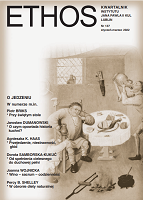PRZEJEDZENIE, NIESTRAWNOŚĆ, GŁÓD DYSFUNKCJE JEDZENIA JAKO STRATEGIE NARRACYJNE W POWIEŚCI „BUDDENBROOKOWIE” THOMASA MANNA
OVEREATING, INDIGESTION, HUNGER: EATING DYSFUNCTIONS AS NARRATIVE STRATEGIES IN THOMAS MANN’S BUDDENBROOKS
Author(s): Agnieszka K. HaasSubject(s): Cultural history, Social history, German Literature, 19th Century Philosophy, Behaviorism, Sociology of Literature
Published by: Katolicki Uniwersytet Lubelski Jana Pawła II - Instytut Jana Pawła II, Wydział Filozofii
Keywords: Thomas Mann; Buddenbrooks; food; novel; Schopenhauer;
Summary/Abstract: Thomas Mann’s novel Buddenbrooks: The Decline of a Family (1901) contains many themes connected with food and the related social, psychological, and cultural phenomena. Not only do the themes in question complete the picture of reality presented in Mann’s work, but they also constitute an element of the writer’s narrative strategy. The author of the article focuses on the antithetically related motifs of overeating, indigestion, and hunger, addressing also their aesthetic function, and concludes that they do not constitute components of the represented world, but structural elements of the novel.
Journal: Ethos. Kwartalnik Instytutu Jana Pawła II KUL
- Issue Year: 35/2022
- Issue No: 1
- Page Range: 131-155
- Page Count: 25
- Language: Polish
- Content File-PDF

